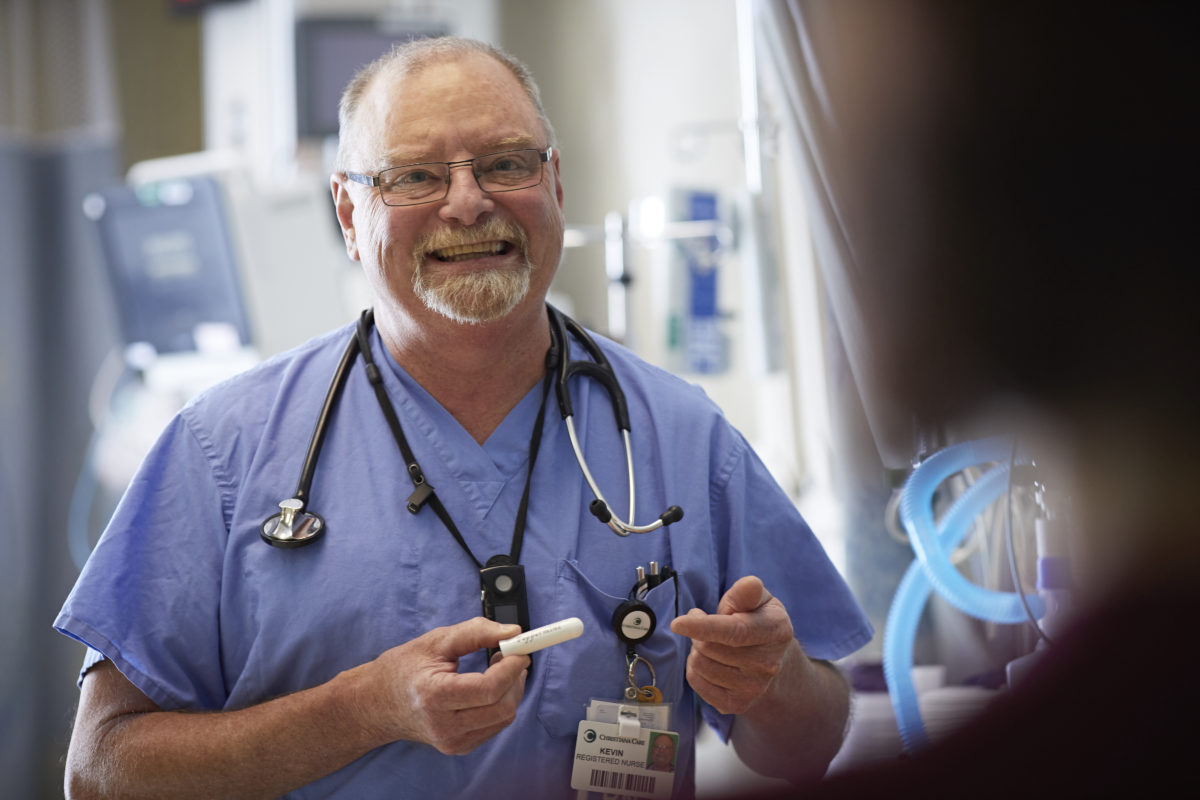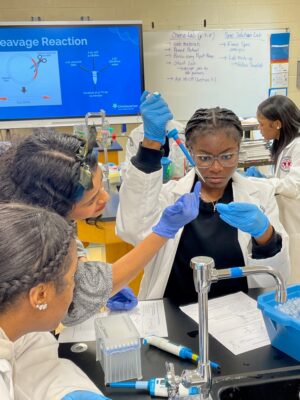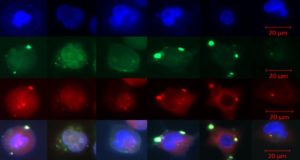A long-time nurse in maternal-child health services at Christiana Care, Linda Daniel, MSN, RN, CPHQ, director of quality and patient safety for the Women & Children’s Service Line, is adding “principal investigator” to her list of accomplishments.
Daniel has long been involved in projects to improve quality and patient safety. Seeking to further improve outcomes and patient experience, she is leading a research project on diminishing pain in early labor in one of the health system’s growing number of nurse-led research projects.
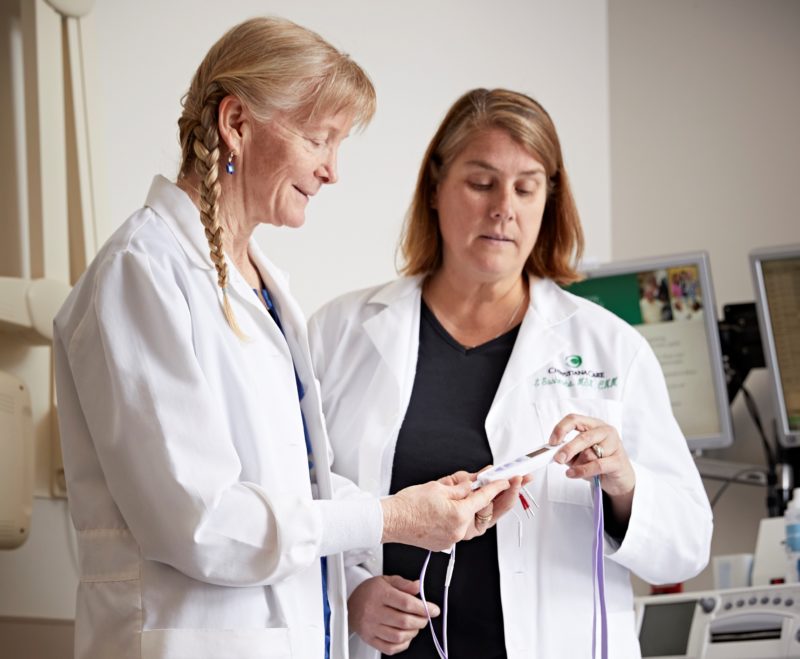
Daniel and nursing colleagues at Christiana Care are studying the use of a pain-management option called transcutaneous electrical nerve stimulation (TENS), used to treat acute pain associated with labor. TENS is used in the United Kingdom, Australia and Canada but not yet in the United States. It is operated by a handheld unit that delivers electricity through electrodes placed on the skin, and it is thought to control pain by blocking pain perception by the brain (known as the gate theory) and through the release of endogenous endorphins (the body’s natural pain relief).
In the study, Daniel and a team of OB Triage and Labor & Delivery nurses will offer TENS to eligible women at triage to see if it will foster continued mobility, reduce false labor encounters in triage and reduce the length of time women need to be in the hospital during their labor. It may also give more women the option to attempt delivery without an epidural.
“Research goes hand-in-hand with performance improvement,” Daniel said. “I am delighted to see nurses taking an active role in improving patient satisfaction and honored to support my colleagues in their journey to help find alternative, drug-free pain options for their patients.”
Nurses like Daniel leading nursing research projects are a growing group, and their discoveries are advancing the professional, scientific practice of nursing, said Chief Nurse Executive Ric Cuming, Ed.D., RN, NEA-BC, FAAN.
Cuming recalled earlier days of the profession when nurses practiced the way they were taught, in what was thought to be the best approach at the time.

Cuming said nursing research allows nurses to ask, “Is this the best way to do this?” and “How do I know?”
“Today, not only are nurses participating in research; in many cases, they are serving as the principal investigators in their own research projects,” he said. “If the nurse isn’t able to answer the ‘how do I know’ question by pulling up empirical evidence to support the intervention, then that is an opportunity for research to generate new knowledge to inform our practice.”
Cuming acknowledged that in everyday practice, it can be easy to forget that nursing is a science based on the nursing process. What must inform that science, he said, is empirical data and evidence-based, scientifically rigorous information. “That is one of the reasons nursing research is so important to Christiana Care, to our nurses and especially to our patients,” he said.
Shaping a nursing research agenda
To help advance nursing practice, under Cuming’s leadership, Christiana Care has re-examined the nursing research structure to help nurses succeed in research. Two part-time nursing research facilitator roles have recently been refined into nurse scientist positions to actively help nurse colleagues conduct nursing research, and to advance the scientists’ own research. The new structure also includes a full-time director of evidence-based practice and nursing research, who will work with Cuming to create a robust, strategic nursing research agenda.
“In a culture of evidence-based practice, nurses need to be able to assess, appraise, translate and implement the evidence in our practice,” said Cuming. “When the question ‘is this the best way to do that?’ hasn’t been answered, there lies the opportunity to conduct nursing research and develop and publish our own evidence.
“When another nurse anywhere in the country — in the world — asks the same question, he or she will find the answer because work done here at Christiana Care has contributed to the existing knowledge base of nursing science.”
Advancing the knowledge
Nurses far and wide are more frequently finding those Christiana Care nurse-generated answers. Last year alone, Christiana Care nurses published nearly 50 peer-reviewed articles and presented on more than 100 local, regional, national and international stages. (See the complete listing in Nursing Annual Report 2016.)
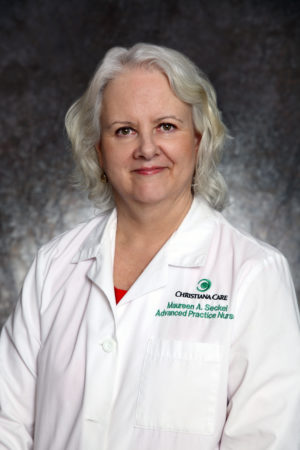
“The evidence to what we do is a passion of mine not only doing the research, but using and disseminating it to help colleagues do the right thing and encourage them to always ask, ‘But why?’” said Maureen Seckel, MSN, APRN, CCRN, FCCM, Christiana Care lead clinical nurse specialist in medical pulmonary critical care.
Seckel is internationally renowned for her leadership in sepsis research and has published and presented widely on the topic. She was appointed as a liaison by the American Association of Critical Care Nurses to serve on the Surviving Sepsis Campaign Guidelines Revision Panel. Guidelines she co-authored with a renowned team of colleagues were published and presented earlier this year through the Society of Critical Care Medicine.
Zeroing in on unmet needs
At any given time, an estimated 350 Christiana Care nurses are advancing new knowledge through capstone research projects for master’s and doctoral degrees. As a family nurse practitioner, Patricia (Trish) McDonnell, MSN, FNP-C, JCC, saw an increasing number of female patients with health issues such as Type 2 diabetes, hypertension and hyperlipidemia struggling with their weight. Her research studies how to address work-life imbalance as a contributing factor to being overweight or obese. The goal for her doctorate in nursing practice health improvement project, titled “Work-Life Imbalance in Women: Negative Impact on Weight,” is to improve healthy eating and weight loss.
Patients who continued in McDonnell’s study improved their weight status, either following a self-directed program or through Christiana Care’s Weight Management Program. Follow-up visits allowed her to measure their weight loss and body mass index, evaluate successes and barriers and identify other needed support services.
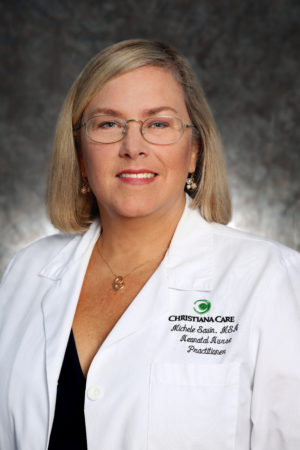
“Through my research, I hope to identify work-life imbalance and its negative impact on weight as a population health issue and work toward evidence-based strategies to improve the health of the community served by modifying their lifestyle and improving their overweight or obese states,” McDonnell said.
Michele Savin, MSN, APRN, NNP-BC, is also using research to address what she perceives as an unmet need among Medicaid-insured patients — babies with neonatal abstinence syndrome.
Her capstone research seeks to identify expected and non-expected use of care in the rst year of life to help these babies avoid rehospitalization.
“As a practicing clinician, I want to contribute to the literature that my colleagues are using, and I want to create value for our patients and for our system,” she said. “Hopefully my research can inform our discharge process and education for parents by increasing what we know about these babies once they leave the hospital. “If they never need the emergency department, that is wonderful, but if they never show up for immunizations, then that raises another concern. Is there something we should be doing to set parents up for more success with wrap-around care in helping link them to a medical home?”
Countless opportunities and resources
Nurse scientist Lynn Bayne, Ph.D., ARNP, NNP-BC, has spent much of her career helping nurse colleagues participate in research for capstone projects, such as McDonnell’s or Savin’s, and for what she describes as “organic,” employee-motivated improvement.

Bayne said opportunities and resources at Christiana Care to help nurses explore an interest in research include journal clubs, which teach how to conduct evidence-based literature reviews, and service on unit-based or system councils, such as the Nursing Research or Evidence-Based Nurse Practice councils. For nurses interested in delving deeper into evidence-based practice, the Nursing Research Council sponsors Nursing Grand Rounds the third Thursday of each month, the annual Tell It In a Poster competition in May and the annual Nursing Research Conference in November.
Research doesn’t always have to come in the form of a pure, scientific study. It can also stem from a formalized program designed to improve the health of the community, documented so others can learn from and implement similar programs.
The nurse-led Blood Pressure Ambassadors Program is an example. Led by Elisabeth Bradley, MS, APRN, clinical leader of the Cardiovascular Prevention Program, and Angela Parker, MSN, RN-BC, project manager, the program trains lay volunteer ambassadors from medically underserved neighborhoods in Wilmington to perform blood pressure screenings and educate their neighbors on the consequences of untreated high blood pressure.
“It was a big leap of faith to train lay people, and we were able to do it through a protocol developed from evidence-based practice,” said Bradley. Last year, the Blood Pressure Ambassadors screened 2,328 of their neighbors, laying the groundwork to educate and link the astounding 64 percent found to have high blood pressure to medical care.
A compliment to our profession
“That nurse-led research is becoming more accepted by the scientific community is a compliment to our profession,” said Kevin Walker, MSN, RN III, CPAN, of the Post Anesthesia Care Unit (PACU) at Christiana Hospital.
Walker is poised to expand the peppermint oil study first introduced at Christiana Care in the Cardiovascular Critical Care Complex by Helen Hawrylack, BSN, CCRN, RN IV, and Patricia Briggs, MSN, RN IV, CCRN, HTCP, HTI/1.
The premise of Walker’s research is that the use of peppermint oil will decrease drowsiness associated with Zofran, used to reduce postoperative nausea, decreasing length of stay in the PACU and ultimately increasing patient satisfaction.
Walker chairs the PACU’s Evidence-Based Practice Council, serves on the Perioperative Evidence-Based Practice Committee and is a member of the Nursing Research Council.
“Research is one of the keys to the future of nursing,” he said. “What we really need to do is get younger nurses excited about research, to become life-long learners, whether through advancing their degrees or enhancing the profession to improve patient satisfaction and outcomes.
“Nursing has a lot to offer research,” said Walker. “And research has a lot to offer nursing.”
